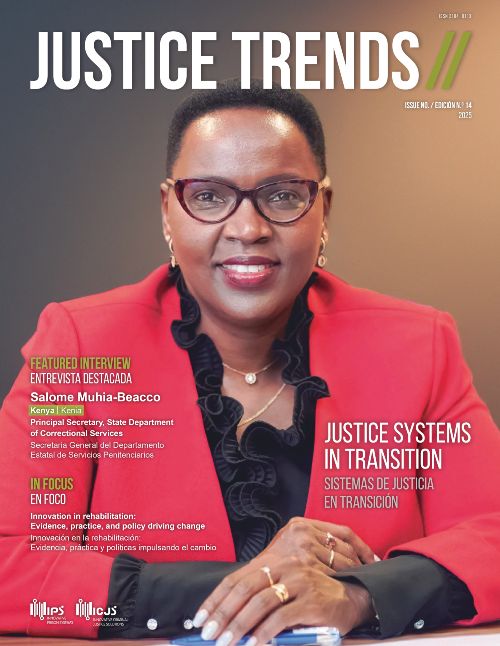Editorial
Unlocking potential: Innovations driving rehabilitation and public safety
Pedro das Neves
Director
Interviews
Reform, rehabilitation and modernisation in Kenya’s Correctional System
Salome Muhia-Beacco
Principal Secretary for the State Department of Correctional Services, Kenya
What works in rehabilitation: Bridging evidence and practice
James Bonta
Ph.D. (Clinical Psychology), Co-author of “The Psychology of Criminal Conduct” (RNR model), Canada
Beyond recidivism: Redefining success in rehabilitation
Fergus McNeill
Professor of Criminology & Social Work, University of Glasgow, UK
Education, work, and community support: Michigan’s approach to lowering recidivism
Heidi Washington
Director of the Michigan Department of Corrections, USA
Reintegration by design: Data-driven, human-centred detention in the Netherlands
Toon Molleman
Deputy Director, Division of Prisons and Foreigner Detention, at the Dutch Custodial Institutions Agency, The Netherlands
Towards 2035: Czechia’s vision for probation grounded in restorative justice
Gabriela Slováková
Director-General of the Probation and Mediation Service Czech Republic
How IACFP supports correctional psychologists, and why their role should go beyond clinical support
Emma Regan
President of the International Association for Correctional and Forensic Psychology (IACFP)
Managing overcrowding and creating opportunities: Practical reforms in Thai prisons
Sahakarn Petchnarin
Director-General of Prisons and Detention Houses of Türkiye
Cognitive-behavioural probation programmes and joint support to reduce violent reoffending in Moldova
Viorel Sochircă
Director of the National Probation Inspectorate of Moldova
Work, Education, and Evidence: Tools for Social Reintegration in Paraná
Ananda Chalegre
Director-General, Paraná State Penal Police Department
Designing rehabilitation around evidence, cultural needs, and access for people on remand
Jessica Borg
Chief Psychologist and Director Programmes at Department of Corrections, New Zealand
Building skills that matter: How Canada’s real-world employment training drives reintegration and public confidence
Chris Hill
Chief Executive Officer, CORCAN
Reintegration as policy: Romania’s shift towards evidence-based corrections
Ioana Morar
Deputy Director-General, Romanian Prison Administration
Experts' Panel
Realizing effective rehabilitation and reintegration
Frank Porporino
Rehabilitation and reintegration: Lessons from the frontlines of research and practice
Articles
Reducing self-harm to improve rehabilitation outcomes
Seena Fazel, Lisa Gunnarsson & Howard Ryland
Innovate to rehabilitate: Shaping the future of justice reform
Claire Machan, Inês de Castro & Ana Rita Pires
Vocational Villages: Building pathways from prison to employment
Heidi Washington
More than a call: How Namibia is rewiring rehabilitation
Dave Lageweg (Telio) & Raphael T. Hamunyela
From containment to transformation: How AI can support inmate rehabilitation and desistance
Pedro das Neves
Paving the way for a restorative-centred approach to justice in cases of hate and extremism
Margarida Damas
Scaling treatment delivery with blended learning models
Ryan Jackson
The transformative role of technology in correctional education
Sarah Spence (MHS)
Small-scale detention in Belgium: A structural reform for social reintegration
Petra Colpaert & Laurence Nibelle
Managing reactivity in corrections: Exploring innovative approaches for aggression regulation
Inês de Castro & Claire Machan
Partners
Hydramist
International Corrections and Prisons Association (ICPA)
Management and Training Corporation (MTC)
MHS Multi-Health Systems
Telio
Featured projects
J-CAP Next Judicial cooperation for the enhancement of mutual recognition regarding probation measures and alternative sanctions - EPP software 3.0
VicTory Restorative and victim-centred approach to mitigate hate and (violent) extremism
NO-OBLIVION Promoting Universal Jurisdiction while Evoking the Crimes Committed within the Former Yugoslavia

